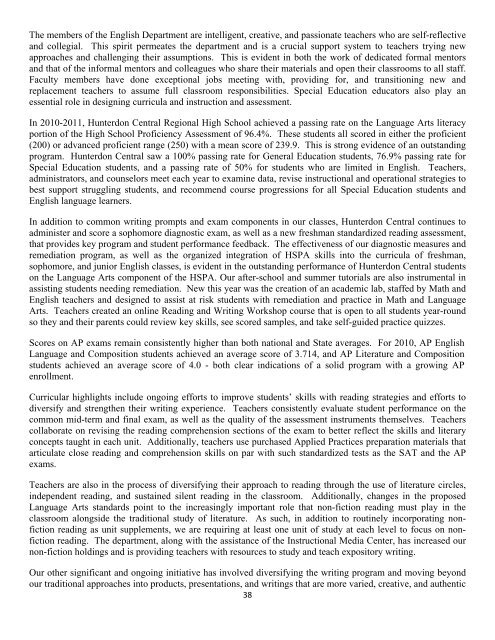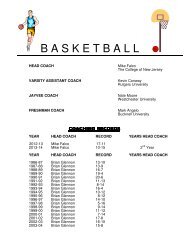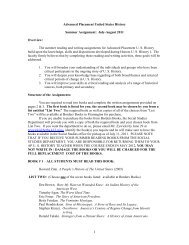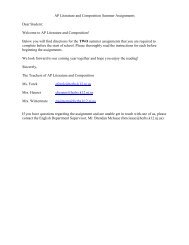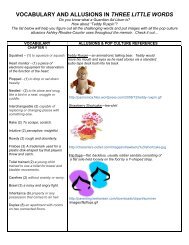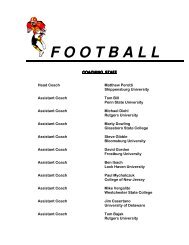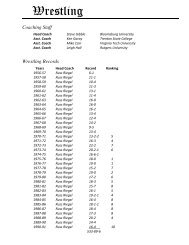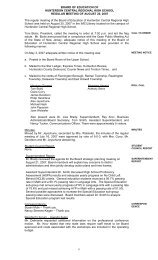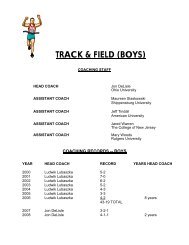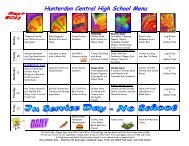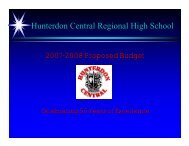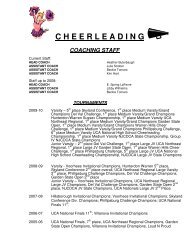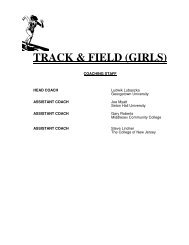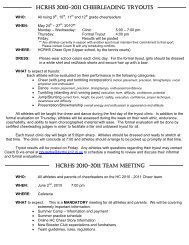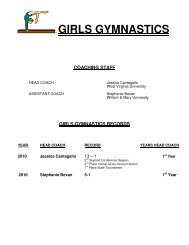HUNTERDON CENTRAL REGIONAL HIGH SCHOOL DISTRICT
HUNTERDON CENTRAL REGIONAL HIGH SCHOOL DISTRICT
HUNTERDON CENTRAL REGIONAL HIGH SCHOOL DISTRICT
You also want an ePaper? Increase the reach of your titles
YUMPU automatically turns print PDFs into web optimized ePapers that Google loves.
The members of the English Department are intelligent, creative, and passionate teachers who are self-reflective<br />
and collegial. This spirit permeates the department and is a crucial support system to teachers trying new<br />
approaches and challenging their assumptions. This is evident in both the work of dedicated formal mentors<br />
and that of the informal mentors and colleagues who share their materials and open their classrooms to all staff.<br />
Faculty members have done exceptional jobs meeting with, providing for, and transitioning new and<br />
replacement teachers to assume full classroom responsibilities. Special Education educators also play an<br />
essential role in designing curricula and instruction and assessment.<br />
In 2010-2011, Hunterdon Central Regional High School achieved a passing rate on the Language Arts literacy<br />
portion of the High School Proficiency Assessment of 96.4%. These students all scored in either the proficient<br />
(200) or advanced proficient range (250) with a mean score of 239.9. This is strong evidence of an outstanding<br />
program. Hunterdon Central saw a 100% passing rate for General Education students, 76.9% passing rate for<br />
Special Education students, and a passing rate of 50% for students who are limited in English. Teachers,<br />
administrators, and counselors meet each year to examine data, revise instructional and operational strategies to<br />
best support struggling students, and recommend course progressions for all Special Education students and<br />
English language learners.<br />
In addition to common writing prompts and exam components in our classes, Hunterdon Central continues to<br />
administer and score a sophomore diagnostic exam, as well as a new freshman standardized reading assessment,<br />
that provides key program and student performance feedback. The effectiveness of our diagnostic measures and<br />
remediation program, as well as the organized integration of HSPA skills into the curricula of freshman,<br />
sophomore, and junior English classes, is evident in the outstanding performance of Hunterdon Central students<br />
on the Language Arts component of the HSPA. Our after-school and summer tutorials are also instrumental in<br />
assisting students needing remediation. New this year was the creation of an academic lab, staffed by Math and<br />
English teachers and designed to assist at risk students with remediation and practice in Math and Language<br />
Arts. Teachers created an online Reading and Writing Workshop course that is open to all students year-round<br />
so they and their parents could review key skills, see scored samples, and take self-guided practice quizzes.<br />
Scores on AP exams remain consistently higher than both national and State averages. For 2010, AP English<br />
Language and Composition students achieved an average score of 3.714, and AP Literature and Composition<br />
students achieved an average score of 4.0 - both clear indications of a solid program with a growing AP<br />
enrollment.<br />
Curricular highlights include ongoing efforts to improve students’ skills with reading strategies and efforts to<br />
diversify and strengthen their writing experience. Teachers consistently evaluate student performance on the<br />
common mid-term and final exam, as well as the quality of the assessment instruments themselves. Teachers<br />
collaborate on revising the reading comprehension sections of the exam to better reflect the skills and literary<br />
concepts taught in each unit. Additionally, teachers use purchased Applied Practices preparation materials that<br />
articulate close reading and comprehension skills on par with such standardized tests as the SAT and the AP<br />
exams.<br />
Teachers are also in the process of diversifying their approach to reading through the use of literature circles,<br />
independent reading, and sustained silent reading in the classroom. Additionally, changes in the proposed<br />
Language Arts standards point to the increasingly important role that non-fiction reading must play in the<br />
classroom alongside the traditional study of literature. As such, in addition to routinely incorporating nonfiction<br />
reading as unit supplements, we are requiring at least one unit of study at each level to focus on nonfiction<br />
reading. The department, along with the assistance of the Instructional Media Center, has increased our<br />
non-fiction holdings and is providing teachers with resources to study and teach expository writing.<br />
Our other significant and ongoing initiative has involved diversifying the writing program and moving beyond<br />
our traditional approaches into products, presentations, and writings that are more varied, creative, and authentic<br />
38


